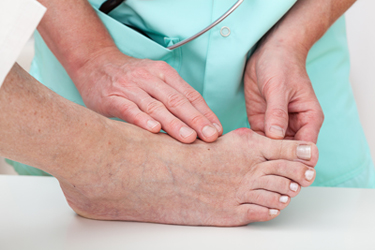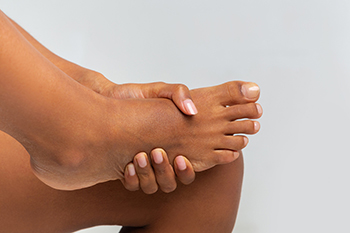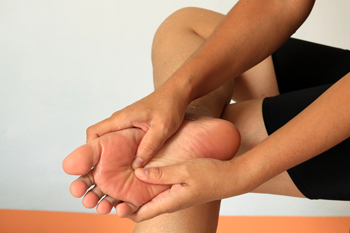Blog
Items filtered by date: April 2023
Is Bunion Surgery Right for You?

A bunion, termed hallux valgus, is a bone deformity of the big toe. This condition can cause the tip of the toe to push toward the smaller toes as the bottom of the toe joint juts outward from the foot. The resulting bump can prove to be painful as it changes the gait and rubs against the inside of the shoe. In some cases, a surgical procedure may be the only option for reducing pain. This may be successful in straightening out the joint, in addition to stabilizing the gait. It can also help to prevent hammertoe and other foot abnormalities from developing. Deciding on bunion surgery depends on various factors, such as the severity of the bunion, and whether it is related to osteoarthritis. Additionally, the impact it may have on completing daily activities or participating in sporting activities may contribute to making this decision. Side effects may include nerve damage, inflammation, and permanent stiffness. It is beneficial to explore this with a podiatrist before deciding on this type of surgery. To find out whether bunion surgery is the right option for you, it is suggested that you consult a podiatrist for an exam and diagnosis.
If you are suffering from bunion pain, contact Dwayne A. Lay, DPM of Elite Foot and Ankle. Our doctor can provide the care you need to keep you pain-free and on your feet.
What Is a Bunion?
Bunions are painful bony bumps that usually develop on the inside of the foot at the joint of the big toe. As the deformity increases over time, it may become painful to walk and wear shoes. Women are more likely to exacerbate existing bunions since they often wear tight, narrow shoes that shift their toes together. Bunion pain can be relieved by wearing wider shoes with enough room for the toes.
Causes
- Genetics – some people inherit feet that are more prone to bunion development
- Inflammatory Conditions - rheumatoid arthritis and polio may cause bunion development
Symptoms
- Redness and inflammation
- Pain and tenderness
- Callus or corns on the bump
- Restricted motion in the big toe
In order to diagnose your bunion, your podiatrist may ask about your medical history, symptoms, and general health. Your doctor might also order an x-ray to take a closer look at your feet. Nonsurgical treatment options include orthotics, padding, icing, changes in footwear, and medication. If nonsurgical treatments don’t alleviate your bunion pain, surgery may be necessary.
If you have any questions, please feel free to contact our office located in Canton, GA . We offer the newest diagnostic and treatment technologies for all your foot care needs.
Foot Pain and Lifting Weights

Foot pain is a phenomenon that affects a wide range of individuals worldwide and can have various causes. People may experience foot pain after performing activities such as lifting weights. Specifically, when an individual lifts weights or performs deadlifts and lunges, they put extra pressure on their feet. If a person does not take enough time between lifting weights to rest, they may neglect recovery time, and foot pain may be more likely to occur. If someone is lifting weights with improper form and technique, this may also be a reason to develop unwanted foot conditions. If you frequently engage in weight lifting, it is suggested that you reach out to a podiatrist today who can provide you with appropriate treatment, if necessary.
Foot Pain
Foot pain can be extremely painful and debilitating. If you have a foot pain, consult with Dwayne A. Lay, DPM from Elite Foot and Ankle. Our doctor will assess your condition and provide you with quality foot and ankle treatment.
Causes
Foot pain is a very broad condition that could be caused by one or more ailments. The most common include:
- Bunions
- Hammertoes
- Plantar Fasciitis
- Bone Spurs
- Corns
- Tarsal Tunnel Syndrome
- Ingrown Toenails
- Arthritis (such as Gout, Rheumatoid, and Osteoarthritis)
- Flat Feet
- Injury (from stress fractures, broken toe, foot, ankle, Achilles tendon ruptures, and sprains)
- And more
Diagnosis
To figure out the cause of foot pain, podiatrists utilize several different methods. This can range from simple visual inspections and sensation tests to X-rays and MRI scans. Prior medical history, family medical history, and any recent physical traumatic events will all be taken into consideration for a proper diagnosis.
Treatment
Treatment depends upon the cause of the foot pain. Whether it is resting, staying off the foot, or having surgery; podiatrists have a number of treatment options available for foot pain.
If you have any questions, please feel free to contact our office located in Canton, GA . We offer the newest diagnostic and treatment technologies for all your foot care needs.
Causes of Peripheral Neuropathy

It is easy to recognize the symptoms of peripheral neuropathy, a condition that results from damage to the nerves in the body’s extremities. Burning, stabbing, and sometimes tingling pain in the feet are common, along with numbness and weakness. This is the result of the brain sending incorrect messages to the feet and toes. Peripheral neuropathy can be caused by diabetes, as the result of prolonged high blood sugar levels. Other causes include side effects of certain medications, hereditary factors, and autoimmune or kidney disease. It can also be a side effect of an underlying condition, such as obesity, alcohol abuse, and high blood pressure. In addition, a deficiency of vitamin B12 has been linked to developing peripheral neuropathy. While this condition is rarely cured, it can be managed to help reduce the symptoms. For more information about peripheral neuropathy that affects the feet and toes, it is suggested that you consult a podiatrist.
Neuropathy
Neuropathy can be a potentially serious condition, especially if it is left undiagnosed. If you have any concerns that you may be experiencing nerve loss in your feet, consult with Dwayne A. Lay, DPM from Elite Foot and Ankle. Our doctor will assess your condition and provide you with quality foot and ankle treatment for neuropathy.
What Is Neuropathy?
Neuropathy is a condition that leads to damage to the nerves in the body. Peripheral neuropathy, or neuropathy that affects your peripheral nervous system, usually occurs in the feet. Neuropathy can be triggered by a number of different causes. Such causes include diabetes, infections, cancers, disorders, and toxic substances.
Symptoms of Neuropathy Include:
- Numbness
- Sensation loss
- Prickling and tingling sensations
- Throbbing, freezing, burning pains
- Muscle weakness
Those with diabetes are at serious risk due to being unable to feel an ulcer on their feet. Diabetics usually also suffer from poor blood circulation. This can lead to the wound not healing, infections occurring, and the limb may have to be amputated.
Treatment
To treat neuropathy in the foot, podiatrists will first diagnose the cause of the neuropathy. Figuring out the underlying cause of the neuropathy will allow the podiatrist to prescribe the best treatment, whether it be caused by diabetes, toxic substance exposure, infection, etc. If the nerve has not died, then it’s possible that sensation may be able to return to the foot.
Pain medication may be issued for pain. Electrical nerve stimulation can be used to stimulate nerves. If the neuropathy is caused from pressure on the nerves, then surgery may be necessary.
If you have any questions, please feel free to contact our office located in Canton, GA . We offer the newest diagnostic and treatment technologies for all your foot care needs.
Heel Pain Can Be Treated!
Why Does My Big Toe Hurt When I Run?

Pain in the joint of the big toe, termed hallux rigidus, is a form of osteoarthritis caused by the wearing away of cartilage between the base of the big toe and the first metatarsal bone of the foot. This condition often affects runners, as the big toe takes the brunt of the continual pounding with each step. Hallux rigidus often develops in runners between the ages of 30 and 60. Some possible causes include having flat feet or overpronation, which is when the foot rolls inward 15 percent or more with each step. Overtraining, a stubbed toe, gout, a toe deformity, or genetics may also play a role in the development of hallux rigidus. Limited mobility and stiffness in the big toe joint are early symptoms of this disorder. In addition, a runner may experience pain and swelling on top of the big toe. Changing to footwear with a larger toe box and stiffer sole can help relieve the pressure on the big toe. Certain medications may also help. A podiatrist can examine the toe, determine the cause of the joint pain, and offer appropriate treatment solutions. It is suggested that you make an appointment today.
Toe pain can disrupt your daily activities. If you have any concerns, contact Dwayne A. Lay, DPM of Elite Foot and Ankle. Our doctor can provide the care you need to keep you pain-free and on your feet.
What Causes Toe Pain?
Most severe toe pain is caused due to a sports injury, trauma from dropping something heavy on the toe, or bumping into something rigid. Other problems can develop over time for various reasons.
Toe pain can be caused by one or more ailments. The most common include:
- Trauma
- Sports injury
- Wearing shoes that are too tight
- Arthritis
- Gout
- Corns and calluses
- Hammertoe
- Bunions
- Blisters
- Ingrown toenails
- Sprains
- Fractures (broken bones)
- Dislocations
When to See a Podiatrist
- Severe pain
- Persistent pain that lasts more than a week
- Signs of infection
- Continued swelling
- Pain that prevents walking
Diagnosis
In many cases the cause of toe pain is obvious, but in others, a podiatrist may want to use more advanced methods to determine the problem. These can range from simple visual inspections and sensation tests to X-rays and MRI scans. Prior medical history, family medical history, and any recent physical traumatic events will all be taken into consideration for a proper diagnosis.
Treatment
Treatments for toe pain and injuries vary and may include shoe inserts, padding, taping, medicines, injections, and in some cases, surgery. If you believe that you have broken a toe, please see a podiatrist as soon as possible.
If you have any questions please feel free to contact our office located in Canton, GA . We offer the newest diagnostic tools and technology to treat your foot and ankle needs.
Blog Archives
- May 2025
- April 2025
- March 2025
- February 2025
- January 2025
- December 2024
- November 2024
- October 2024
- September 2024
- August 2024
- July 2024
- June 2024
- May 2024
- April 2024
- March 2024
- February 2024
- January 2024
- December 2023
- November 2023
- October 2023
- September 2023
- August 2023
- July 2023
- June 2023
- May 2023
- April 2023
- March 2023
- February 2023
- January 2023
- December 2022
- November 2022
- October 2022
- September 2022
- August 2022
- July 2022
- June 2022
- May 2022
- April 2022
- March 2022
- February 2022
- January 2022
- December 2021
- November 2021
- October 2021
- September 2021
- August 2021
- July 2021
- June 2021
- May 2021
- April 2021
- March 2021
- February 2021
- January 2021
- December 2020
- November 2020
- October 2020
- September 2020
- August 2020
- July 2020
- June 2020
- May 2020
- April 2020
- March 2020
- February 2020
- January 2020
- December 2019
- November 2019
- October 2019
- September 2019
